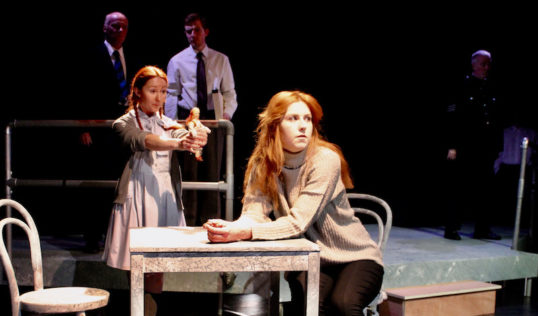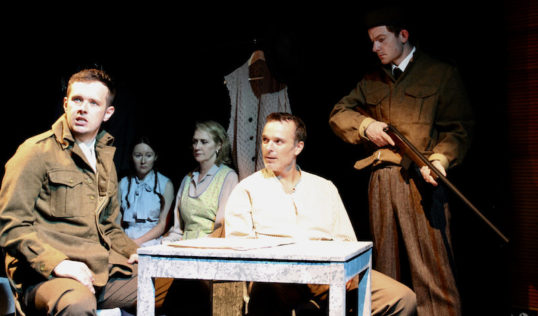Arandora Star
★★★★☆ Poignant tragedy
Scottish Storytelling Centre: Tue 22 – Sat 26 May 2018
Review by Rebecca Heap
In this reverent, haunting and heartfelt production of Arandora Star at the Scottish Storytelling Centre to Saturday, Theatre Objectiv both condemns and exonerates in their efforts to give a voice to an oft-forgotten past.
The sinking of the SS Arandora Star on 2nd June 1940 devastated the Scots-Italian community. Of the 713 people who lost their lives, 486 were interned Italians being transported to Canada by HM Government. Yet responsibility for failings remained largely unacknowledged by those in authority.
This production embraces our responsibility to those who lost their lives, to examine closely and to tell the stories that history has silenced. Writer Raymond Raszkowski Ross’ characters lend their perspectives of those facing prejudice, suffering and oppression in wartime Britain.
The ship was sailing without a convoy and denied the safety of the Red Cross despite carrying Prisoners of War, safety measures were compromised in favour of high walls of barbed wire. As a sitting duck for German U-boats, was this a gross mistake, a conspiracy or a cover-up?
The play is split into three narrative perspectives, interwoven together to create a tapestry of pocket-worlds on stage. Linked by one family, it shows the ripples of a tragedy down a bloodline, beginning with the unjust internment and transportation of Italian family man Giovanni, played by a serene and amiable Michael Cooke.
Giovanni’s suffering is shadowed by that of his family in Edinburgh, especially his daughter Maria. Andrea McKenzie convincingly demonstrates the physicality of a wide-eyed innocent, struggling to comprehend the shifting landscape and uncertainties of war. Maria perfectly encapsulates the struggle to define identity as a child of two worlds.
standout performances
The furthest ripple and the third setting for the narrative greets a now grown Maria played by the brilliant Catriona McFarlane valiantly facing an interrogation by the fearsome John McColl as the nameless Major. These are standout performances, as McFarlane and McColl’s scenes crackle with tension and bold characterisation.
McFarlane’s Maria unflinchingly tackles the formidable face of the establishment ‘machine’, embodying the fierce intelligence and bravery of the perfect heroine. Such interactions immediately recharge the atmosphere, ready for the next emotional onslaught.
This is not merely a harrowing production, but one intent on broadcasting the apparent indifference, nay malevolence of the powers that be to such a horrific incident.
Director Donald Smith utilises the whole cast as a chorus, providing an element of musical punctuation to snapshot moments. These motifs steer the story across the decades, providing conscious links to the past, such as when a young Maria and her older-self sing the same hymn, then powerfully when the cast deliver a spine-chilling invocation of De Profundis (Psalm 130).
There are moments where the show misses its mark. In scenes following the backlash and assumed coverup after the tragedy, a host of contemporary political players defend or attack the actions of government without any introduction. Unfortunately, unless possessed of sufficient historical background to the period, one may struggle to follow any point the scene made. The scene demonstrates the ‘machine’ at work, yet in practice, it is messy in its rowdiness and could use a tighter edit.
Overall, this is a production which tackles its message head-on, lending a greater scope to the murky side of British history whilst packing a stunning emotional punch sure to leave you thinking.
Running time 2hrs 30 mins (including one interval)
Scottish Storytelling Centre, 43-45 High Street, EH1 1SR
Tuesday 22 – Saturday 26 May 2018
Evenings: 7.30pm.
Tickets and details: www.tracscotland.org.
Company website: www.theatreobjektiv.co.uk.
Production Facebook even page: www.facebook.com/events
ENDS




















